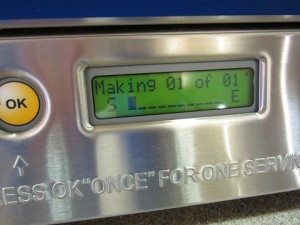Our Birgitta began drawing faces at age 3 and never stopped, so with all those years of practice, her portraits have become (I believe) quite good.
When she was little, though, she drew primitively like most children do. As her attention span lengthened and she focused on one piece of paper longer, she added more detail. This picture was drawn at age 4, and like all her creations, I loved asking her about it.
“Who’s this?” I said.
“It’s a girl. She’s thinking.”
“About what?”
“Cookies,” she said. “She loves cookies.”
“She has a pretty bow,” I said, noticing its three parts colored differently.
“For her curly hair.”
We talked about the elbow marks, the hairy eyebrows, the beautiful teeth, the dramatic makeup, and the curly bangs. I saw how she’d carefully colored the inside of her mouth red and put pupils in the eyes, nostrils on the nose.
Life’s important stuff is in the details. When we buy a new car, we want to know everything it can do. When we purchase a product at the grocery store, we flip it over to read its ingredients. When someone has a baby, we want the blow-by-blow of labor and delivery.
Our quest for detail is also true when we ponder the events of Good Friday, but God hasn’t told us everything we want to know. I’d like to know how much detail Jesus himself knew ahead of time about those last 48 hours.
When did he learn Judas was a traitor? Did he know it when he first chose him? What about the bogus trials he’d have to endure and the humiliation he would experience through the mocking of his captors? Did he know the extent of that ahead of time? Did he know his disciples would run when he needed them most? His words to Peter about betrayal hinted that he did.
Did he have an inkling of how brutal the Roman torture would be? And did he really believe his Father would turn away completely? Surely these details had all come clear by the time he was agonizing in the garden, face to the ground.
Tonight at our church we attempted to participate in some of the details of those last 48 hours as we walked The Stations of the Cross: tasting his salty tears, lifting his heavy cross, tearing fabric to represent his torn flesh. We think maybe if we knew more, we might be able to participate more in his suffering.
Though Scripture tells us much, a great deal is left unsaid. But just like the detail in Birgitta’s current drawings has become more complete (at left), I believe Jesus will one day let us know the particulars of his incredible sacrifice. It’ll happen when we’re living with him in paradise, and when we get the full knowledge of those last 48 hours, we’ll go flat on our faces before him, awed that he endured so much…
…for us.
“Grace was given us in Christ Jesus before the beginning of time, but it has now been revealed through the appearing of our Savior, Christ Jesus, who has destroyed death and has brought life.” (2 Timothy 1:9,10)







